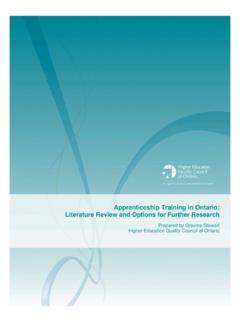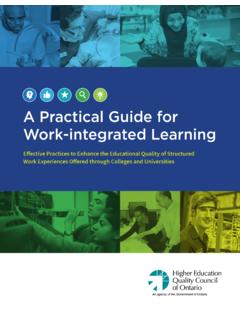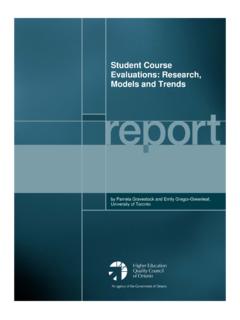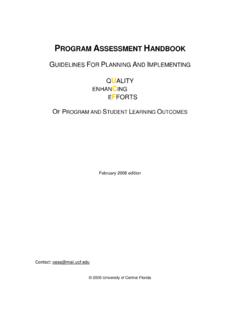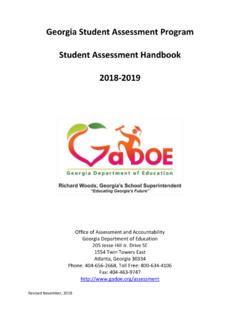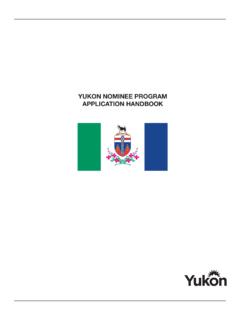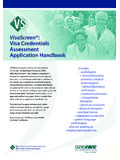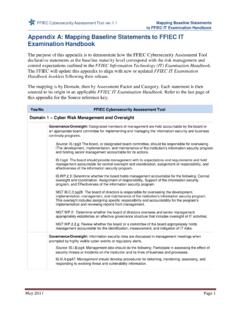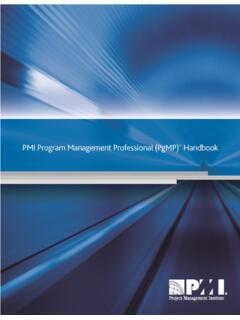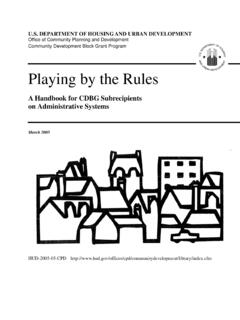Transcription of Learning Outcomes Assessment - HEQCO
1 Learning Outcomes Assessment : A PRACTITIONER'S HANDBOOK. Authors: Lori Goff (McMaster University), Michael K. Potter (University of Windsor), Eleanor Pierre (EJPC ommunications & Mohawk College), Thomas Carey (Transforming Learning Together/San Diego State University/Kwantlen Polytechnic University), Amy Gullage (McMaster University), Erika Kustra (University of Windsor), Rebecca Lee (McMaster University), Valerie Lopes (Seneca College), Leslie Marshall (Mohawk College), Lynn Martin (McMaster University), Jessica Raffoul (University of Windsor), Abeer Siddiqui (McMaster University), Greg Van Gastel (McMaster University). Acknowledgements: With thanks to the essential contributions of Peter Marval from the University of Windsor, and of the international advisors, Gordon Joughin, Arshad Ahmad and Lesley-Jane Eales-Reynolds. The creation of this handbook was supported by the Higher Education Quality Council of Ontario ( HEQCO ). TABLE OF CONTENTS.
2 PREFACE 4. SECTION 1: OVERVIEW AND FRAMEWORK 7. Assessment of Program-Level Learning Outcomes 8. Concepts and Principles 12. Creating a Plan for the Assessment of Program-Level Learning Outcomes 19. SECTION 2: Assessment PRACTICES 28. Critical Thinking, Problem Solving, Judgment and Insight 30. Research and Scholarship 33. Communication 35. Creativity and Design 38. Self-Regulation and Professional Competence 39. SECTION 3: DEVELOPING INSTITUTIONAL CAPACITY 42. Shifting the Institutional Culture and Increasing Authentic Assessment Practices 43. Authentic Assessment 52. Future Trends 55. SUMMARY 58. WORKS CITED 59. ADDITIONAL REFERENCES 62. PREFACE. This handbook is intended to serve as a resource for faculty, staff, academic leaders and educational developers engaged in program and course design/review, and the Assessment of program-level Learning Outcomes for program improvement. The Assessment of Learning Outcomes at the program-level can assist in making improvements to curricula, teaching and Assessment plans.
3 HOW TO USE THIS HANDBOOK. The handbook is designed so that you can either jump to particular sections or read sections sequentially. The definitions, examples, cases and recommendations included are designed to help you develop effective assessments for program-level Learning Outcomes but will need to be evaluated and adapted to your specific institutional context. Definitions and Examples Key terminology defined. Section 1 explores the theory, principles, reasons for and methods behind producing program-level Learning Outcomes . In Section 2, we review a variety of practices and emerging developments in Learning outcome Assessment . In Section 3, we provide tips and techniques for developing institutional capacity through building institutional culture, increasing faculty involvement in the process of program-level Learning Outcomes Assessment , and examining methods for Case Studies Sample applications and ideas. curriculum-embedded Assessment .
4 Using this guide to develop a plan for program-level Learning Outcomes Assessment can help steer the systematic collection of data and enable its use to continually improve the effectiveness of your programs and demonstrate to others how well your students are Learning . Recommendations Sample questions and suggestions. PREFACE. 4. THE INTERNATIONAL CONTEXT. The Assessment of Learning Outcomes at the program level has The Australian government has taken an active role in been a topic of international interest as a method for quality quality assurance since the 1980s (Chalmers, 2007) and the Assessment and ongoing program quality enhancement. Australian Learning and Teaching Council facilitated the According to a UNESCO report (Altbach, Reisberg & Rumbley, articulation of Learning Outcomes within disciplines through 2009), increasing global integration and exchange of both the Learning and Teaching Academic Standards project students and instructors has been an important international in 2010.
5 Despite much attention on the development of objective in higher education in recent years. This trend Learning Outcomes , the alignment of course Outcomes with requires institutions to identify standards of quality, resulting curriculum and program-level institutional Assessment poses in an increased emphasis on both Learning Outcomes and a challenge internationally (Barrie, Hughes & Smith, 2009;. evidence from course assessments to demonstrate that Barrie, Hughes, Crisp & Bennison, 2012). The Organisation students have mastered the expected Learning . While there for Economic Co-operation and Development (OECD) has is widespread agreement that institutional autonomy is initiated an international project to address this difficulty. The important, researchers also agree that students would Assessment of Higher Education Learning Outcomes (AHELO). benefit from greater clarity around Learning Outcomes project aimed to examine student results of standardized tests (Harris, 2009; Tremblay, Lalancette & Roseveare, 2012).
6 The used to measure Learning outcome attainment at the cross- Bologna Tuning Process1, which involved over 40 countries, disciplinary and the disciplinary levels, with the intention of has significantly contributed to international discussions of producing data that could inform institutional improvement quality, Learning Outcomes and other processes to promote (Harris, 2009; Tremblay, Lalancette & Roseveare, 2012; Lennon transparency, mobility and employability (Altbach et al., 2009; & Jonker, 2014). Barrie, Hughes, Crisp & Bennison, 2011). Other movements Canada has also participated in inter-jurisdictional projects have worked to identify and assess Learning Outcomes at designed to pilot the use of standardized tests to assess broad levels and across disciplines; for example, the Dublin student attainment of discipline-specific Learning Outcomes . Descriptors define Learning Outcomes across the European For example, the Higher Education Quality Council of Ontario higher education sector (Harris, 2009).
7 ( HEQCO ) has trialed the use of the Collegiate Learning Recently, attention has also been focused on discipline- Assessment with civil engineering students (Lennon, 2014). specific Learning Outcomes . For example, the United Kingdom Concerns related to sample size and self-selection bias Quality Assurance Agency engaged in a process to identify were raised, including fears that information might be more focused disciplinary Learning Outcomes called Subject used for ranking and to re-allocate public resources to the Benchmark Statements, which are evaluated by external detriment of institutions, and that the limited information examiners. The Bologna Tuning Process (1999), Tuning Latin from standardized tests would be too simplistic for use in America Projects (2004) and Tuning USA (2009) worked to complex institutional contexts (Tremblay et al., 2012; Lennon, identify disciplinary Learning Outcomes (Harris, 2009; Barrie 2014). Even though international projects are beginning to et al.)
8 , 2011). Similarly, the Valid Assessment of Learning in explore methods to assess Learning Outcomes at program Undergraduate Education (VALUE) focused on Assessment or institutional levels, Assessment remains a difficult and through generation of rubrics in the US (AACU, 2009). complex task. PREFACE. 1. For more information on the specifics of the Bologna Process, visit 5. THE ONTARIO CONTEXT. Similar to trends in the international context, the Ontario of programs of instruction by the local college's board of postsecondary system has been involved in identifying governors, makes up a component of the self-regulatory program-level Learning Outcomes for many years, with strong mechanism for the college system (Ontario College Quality leaders especially at the college level. In 1990, the provincial Assurance Service, 2014). government published Vision 2000: Quality and Opportunity, With the implementation of the Quality Assurance Framework in which it recommended establishing a council mandated to (Ontario University Council on Quality Assurance ((OUCQA), develop program standards for the college system (Ontario 2012) and the Degree Level Expectations (Ontario Council of Council of Regents for Colleges of Applied Arts and Technology, Academic Vice-Presidents (OCAV), 2007; Council of Ontario 1990; Ministry of Training, Colleges and Universities (MTCU), Universities (COU), ), Ontario universities are now also 2006a, 2006b).
9 Both college and university programs now use committed to the Assessment of program-level Learning a set of program-level Learning Outcomes to determine what Outcomes and the continuous improvement of academic students are expected to achieve by the time they graduate. Learning . Both colleges and universities follow self-regulatory Many institutions in Ontario have also developed expectations processes. Universities submit program-level Learning at the institutional level, often called graduate attributes Outcomes through the Ontario University Council on Quality (Barrie et al., 2009). Assurance, following an institutional process that is consistent College programs include: 1) a vocational standard specific with the Quality Assurance Framework (OUCQA, 2012). to the program; 2) essential employability skills standards The Assessment of program- or degree-level Outcomes is critical for success in the workplace, daily life and lifelong an integral part of Learning -centred education.
10 It provides Learning ; and 3) general education requirements for breadth an ongoing mechanism for challenging tacit assumptions and development of citizens (MTCU, 2006b), which students about program effectiveness, identifying conflicting program must meet prior to graduation. A program team, in conjunction elements and ensuring that student Learning objectives are with advice from a curriculum specialist, will develop a set met. It also allows for the continuous improvement of program of program-level Learning Outcomes that follow the Ministry goals and objectives over time. HEQCO , together with COU and of Training, Colleges and Universities' (MTCU) program the OCQAS (Ontario College Quality Assurance Service), has description and which become part of the historical record of promoted the Assessment of Learning Outcomes at the course the program. The Postsecondary Education Quality Assessment and program levels at both colleges and universities.
